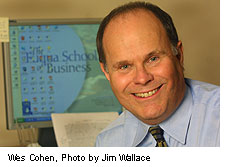
Fuqua Professor Maps Technological Change
New faculty member combines interest with development of the Third World with studies of how innovation promotes change
By Gail Brennan
October 25, 2002 | DURHAM, NC -- As a new professor of management and economics at the Fuqua School of Business, Wes Cohen moves in a world devoted to theory and research and analysis.
But it was his quick-thinking ability to talk nonsense that may have saved his life.
While a graduate student at Yale, Cohen received an independent travel grant that allowed for six months of research in Zaire (currently the Congo) in central Africa. Late one night, while driving on an isolated stretch of road between work and home, Cohen was stopped at a military blockade by a half dozen soldiers. One soldier pointed his machine gun at Cohen, cocked it, and accused Cohen of trying to run him over.
"Instinct took over," Cohen recalls. "In my thickest American accent, I repeatedly told the soldier that I did not know which way to turn at the next fork in the road, and was terribly grateful that he and his comrades were there to guide me."
When the soldier looked confused, Cohen picked up the pace of his patter. Eventually, the soldier lowered his gun and let Cohen pass.
"Without a doubt, Zaire was the most dangerous African country I have been in."
It was Cohen's curiosity in Third World development - he also spent a year installing water supply systems in Madagascar and a summer researching a thesis in Ivory Coast - that led to his interest in economics. Through economics, Cohen reasoned, he could make a difference in the developing world.
After earning his Ph.D. in economics at Yale, Cohen's focus further evolved to the study of multinational firms and then to industrial organization economics. For nearly the past 20 years, his research has examined the forces of technological change. Most recently, he has delved into how patent policy and intellectual property rights stimulate research and development. An upcoming paper will look at the effect of licensing on biomedical innovation.
"I am driven to see how my theories map to empirical realities. I am motivated by the opportunity to solve important questions and problems and to understand their policy implications," Cohen says.
Prior to joining the faculty at Fuqua, Cohen spent 20 years at Carnegie Mellon, where he helped build the Department of Social and Decision Sciences. One factor that attracted Cohen to Duke was an intellectual excitement similar to the one that he experienced at Carnegie Mellon.
"Fuqua is an intellectually exciting place to be," Cohen says. "I have the freedom to research and teach issues with real-life implications."
While at Fuqua, Cohen plans to take an interdisciplinary approach to studying innovation. "Duke as a whole has made a commitment to the study of innovation in technological change. As part of this initiative, for example, I look forward to sharing knowledge and ideas with intellectual property professors in the law school," Cohen says.
In addition, as a student of technological innovation, Cohen is excited about his relocation to the Research Triangle Park area, where he is close to a number of innovative biotech, telecom and software companies.
He also likes the opportunities that the region presents for his wife, Kathryn Cline, who works in the health care field, and their 10-year old daughter Julia.
Cohen says his original passion for the study of developing nations has not disappeared. "I am intrigued by the possibility of returning to this line of research in the future. I can see myself studying issues such as how international patent laws impact the distribution of badly needed AIDS drugs and other drugs in developing nations. My goal would be to promote international policies that advance the economic interests of both developed and developing nations."
Related Links
Patents: Their Role and Their Effectiveness
|





